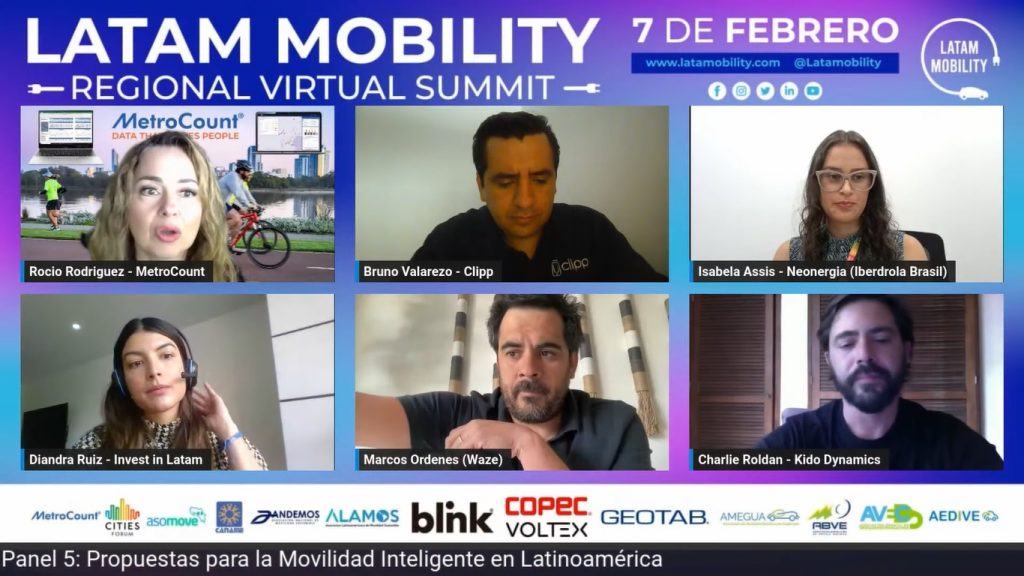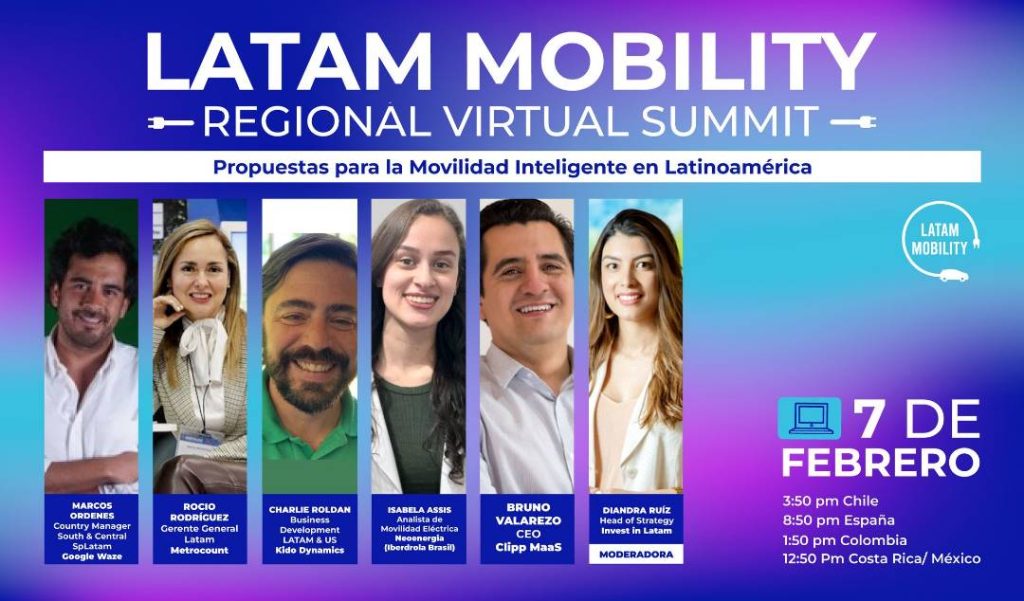Advancing towards sustainable mobility in Latin America not only requires electric vehicles, but also a whole logistics behind them, supported by technology, applications, software development and other elements that communicate with each other to pave the way towards zero carbon emissions in the right way.
Knowing this, Latam Mobility organized the Regional Virtual Summit 2023, bringing together various experts in mobility, technology and development to carry out the panel of proposals for intelligent mobility in Latin America.
The panel was formed by Marcos Órdenes, Country Manager South & Central SpLatam of Google Waze; Rocío Rodríguez, Metrocount’s General Manager for Latin America; Charlie Roldán, Business Development LATAM & US of Kido Dynamics; Isabella Assis, Electric Mobility Analyst at Neoenergía (Iberdrola Brazil), and Bruno Valarezo, CEO of Clipp MaaS, who spoke under the moderation of Diandra Ruíz, Head of Strategy at Invest in Latam.
Encouraging Bicycle Transportation
Rocío Rodríguez, representative of Metrocount, an Australian company with presence in more than 130 countries dedicated to creating technology to monitor the movement of vehicles, bicycles and people, highlighted the importance of bicycles as a means of transportation, in addition to the benefits offered by the company in favor of sustainable mobility.
“We work with our equipment to process data so that governments and private entities can expand bicycle lanes. There, we advise which are the best methods to do so, because in the end it is about offering good sustainable and safe transportation,” she assured.
In that sense, he revealed that the vision for 2023 is to continue supporting the industry, both government and private, through its expertise in all senses (technical and software), with the objective of having more bike paths.
Thus, those people who for some reason or another do not want to or cannot use public transport, can opt for a bicycle and a clear route within the routes they want to do.
Related content: Geotab, Autocab, LeasePlan and Goal Systems Introduce Business Transportation Advances and Fleet Management Solutions
On the other hand, regarding what they can contribute to the development of sustainable mobility, he stressed that they work “hand in hand” with contractors and governments regarding the data collected through their equipment, so that they become reference points that specify where there is more traffic.
“With this information, a database is created that generates reports and benchmarks. This way, we can determine how and where to place vehicle chargers at strategic points,” she concluded.
2023 May be the Year
Marcos Órdenes, executive of Waze, Google’s mobility application for Central and South America, explained that the objective of his organization is to “end traffic, all together”, by means of the positioning they have in the region promoting a different way for people to move around.
He also made special emphasis on the expectations of sustainable mobility in Latin America, given that there are more than 40 countries in the region, where each one of them are at very different points in terms of access to electrification, public transportation, etc.
Waze assures that the increase in vehicles has been considerable after the pandemic, generating a greater presence on the streets, more traffic and therefore more pollution. However, this has led several countries to attack the carbon footprint caused by the transportation sector, forcing them to act on electromobility.
In this way, he assured that 2023 could be one of the great initiating years for the movement of sustainable change that the region is experiencing, getting a little closer to the advanced state seen in other places, such as the United States or Europe.

On the other hand, in relation to the challenges to be faced, he highlighted the issue of electric chargers, which generate doubts in many users who wish to have an electric car, but do not know how the environment will behave in terms of charging infrastructure.
“These are small obstacles that force the user not to buy the car, therefore, one of the ideal solutions would be to focus on this challenge going forward for it, where in that sense, Waze has launched an application in three countries to map the location of electric chargers, we seek to inform the user so that they know where to charge their vehicle,” he commented.
The Next Three to Five Years, Key for Latin America
Charlie Roldán, representative of Kido Dynamics, a startup born in Switzerland in 2018 dedicated to data intelligence with a special focus on people’s mobility, highlighted the role that technology will play in the region, raising the importance of the coming years in that matter.
The company that Roldán represents draws conclusions and offers solutions through the study of people’s trajectories and the digital mobility footprint they leave behind, using the information gathered to elaborate a better decision-making process.
“The biggest challenge pre-pandemic had been interpreting the science of what is being done in electric mobility. However, the breakthroughs of 2022 make 2023 a catalyst for a lot of things to happen for electric mobility,” Rodán said.
However, he also stressed that the process is not symmetrical throughout Latin America, being necessary to make it clear that progress will not be the same. For example, Chile and Colombia are more advanced in relation to other nations.
In this sense, he raised the importance of “becoming super productive in Latin America in the next 3 to 5 years to advance in terms of new technologies that can be used in favor of mobility in the region”, emphasized the executive of Kido Dynamics.
This perspective is in line with the reality of the “chaos” experienced in cities in relation to the large number of people living there. “Faced with this, it is necessary to have tools so that, automatically, all artificial intelligences can give a pulse to the cities to improve urban life,” he said.
Decarbonization: A Complex Issue
Isabella Assis, executive of Neoenergía, an Iberdrola company in Brazil dedicated to the electricity sector chain (generation, transmission, distribution and commercialization), revealed that the decarbonization of the mobility and transportation sector is a complex issue, as each country is going through different development scenarios.
“Our perspective knows that each country is in different development scenarios, although there are similar points in the Latin American ecosystem,” Assis assures. “For example, we have a strong population living in highly urbanized areas where a large amount of carbon dioxide emissions come from the transportation sector,” she continued.
This has led many countries to declare the transportation segment as a priority to meet their climate targets in that sector, where electrification comes into play. “It is noticeable that Latin American nations are prioritizing the electrification of transportation, with Colombia and Chile being good references of this.”
However, for Assis, the real perspective of decarbonization is a very complex issue, since there are different types of vehicles with different operations.
Now, despite this, work must continue to strengthen the weaknesses, knowing that many nations have great potential for development. “Especially in Brazil I see great potential given that we have a road-based structure, where we are seeing a growing number of electric vehicle sales, therefore, a strong and dedicated investment in electrification and green hydrogen will be essential,” she concluded.
“Nothing more Voluntary than Mandatory”
Bruno Valarezo, executive of Clipp MaaS, a startup dedicated to the digitization of mobility by creating solutions for cabs, public transport, bicycles and scooters with the aim of seeking interaction with the different mobility actors in cities, exposed the need to transform actions as obligations to achieve significant changes in the urban mobility sector.
“Mobility as a service is our motto, where we work with companies in the sector. Although, while many focus on accommodating electric mobility, one of the important objectives is to ask ‘how can we make better use of existing mobility,'” Valarezo assures.
“Something I like from Europe that would be good to see in Latin America is the trend of institutional or corporate mobility plans,” says the executive with the intention of highlighting that companies should have a mobility plan that analyzes how their workers move from point A to point B.
“We are missing that mandatory part in the region. There need to be regulations or standards that impose certain parameters. For example, companies with more than 100 workers must know how their employees move to and from work,” Valarezo concluded.




